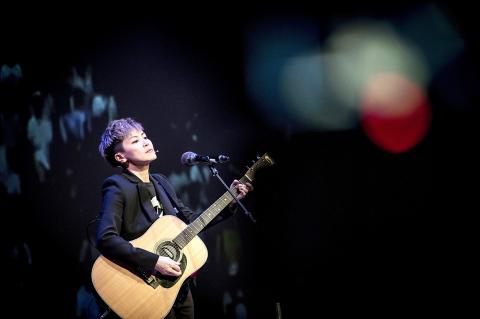For the second year running, the US-based Human Rights Foundation is bringing the Oslo Freedom Forum to Taiwan for a one-day event centered on democracy and human rights.
Founder Thor Halvorssen, who will make his first visit to Taiwan for the forum next Friday, invited Taiwan to “unify and use even more creative methods to call for democratic freedoms.”
Alex Gladstein, chief strategy officer for the foundation, called upon people to be more sensitive to democracy and freedoms “especially in the age of digital information,” and to avoid letting disinformation affect democratic elections.

Photo courtesy of the Human Rights Foundation
As the only edition of the Oslo Freedom Forum held outside of Norway, this year’s forum assembles an impressive roster of grassroots activists and political influencers with ties to Asia.
Cantopop diva Denise Ho (何韻詩) has become better known for her fiery LGBTQI and pro-democracy activism in recent years. Her vocal support for the Umbrella movement in 2014 saw her blacklisted in China, but she continues to be active in ongoing protests in the financial hub.
At the flagship Oslo Freedom Forum in Norway earlier this year, the Hong Kong-Canadian singer’s speech on “creative dissent” during the Umbrella movement ended with a rousing song about the hopes and fears of democracy activists.

Photo courtesy of the Human Rights Foundation
She will perform at the forum’s opening, with Minister Without Portfolio Audrey Tang (唐鳳) set to deliver the opening address.
The forum continues to celebrate the work of journalists illuminating developments in parts of the world where democracy is under siege.
They include American journalist Melissa Chan, whose reporting from China for Al Jazeera English earned her an expulsion from the country in 2012, and Yang Yuan (楊緣), Financial Times technology correspondent based in China.
Esther Htusan, a Kachin reporter from Myanmar, was part of a team that won a Pulitzer Prize in 2016 for their reporting on forced labor and human rights violations in Southeast Asia’s fishing industry. She is expected to address the failed promises of democratization in her country.
North Korean defectors Thae Yong-ho — the country’s former deputy ambassador to the UK and one of its highest-ranking officials to defect — and Park Yeon-mi — who escaped at the age of 14 — will continue to train a spotlight on human rights abuses in the secretive state.
In conjunction, attendees are encouraged to bring unwanted USB drives and SD cards for the HRF’s Flash Drives for Freedom campaign. The flash drives are used to smuggle South Korean and Western movies, books, Wikipedia articles and television shows into North Korea.
Student activism in Thailand has a bloody history, especially in association with the Thammasat University massacre in 1976. But Netiwit Chotiphatphaisal has been juggling his studies at Chulalongkorn University with activism for education reform and against rule by military junta.
Other speakers include Audrey Mbugua, a Kenyan transgender activist and Molly McKew, a specialist on information warfare. Boston Celtics player Enes Kanter, who hails from Turkey, where he has been censured for criticism of strongman President Recep Tayyip Erdogan, will also meet audiences through a video link.
Aside from presentations by the speakers, participants will also have an opportunity to attend networking sessions with other activists and advocates.
■ Sept. 13, from 8am to 6pm at Grand Hyatt Taipei (台北君悅酒店), 2, Songshou Rd, Taipei City (台北市松壽路2號)
■ Conference passes at US$19.21 are available until Sep. 9 at: bit.ly/2YeLKJR

Towering high above Taiwan’s capital city at 508 meters, Taipei 101 dominates the skyline. The earthquake-proof skyscraper of steel and glass has captured the imagination of professional rock climber Alex Honnold for more than a decade. Tomorrow morning, he will climb it in his signature free solo style — without ropes or protective equipment. And Netflix will broadcast it — live. The event’s announcement has drawn both excitement and trepidation, as well as some concerns over the ethical implications of attempting such a high-risk endeavor on live broadcast. Many have questioned Honnold’s desire to continues his free-solo climbs now that he’s a

As Taiwan’s second most populous city, Taichung looms large in the electoral map. Taiwanese political commentators describe it — along with neighboring Changhua County — as Taiwan’s “swing states” (搖擺州), which is a curious direct borrowing from American election terminology. In the early post-Martial Law era, Taichung was referred to as a “desert of democracy” because while the Democratic Progressive Party (DPP) was winning elections in the north and south, Taichung remained staunchly loyal to the Chinese Nationalist Party (KMT). That changed over time, but in both Changhua and Taichung, the DPP still suffers from a “one-term curse,” with the

Jan. 26 to Feb. 1 Nearly 90 years after it was last recorded, the Basay language was taught in a classroom for the first time in September last year. Over the following three months, students learned its sounds along with the customs and folktales of the Ketagalan people, who once spoke it across northern Taiwan. Although each Ketagalan settlement had its own language, Basay functioned as a common trade language. By the late 19th century, it had largely fallen out of daily use as speakers shifted to Hoklo (commonly known as Taiwanese), surviving only in fragments remembered by the elderly. In

William Liu (劉家君) moved to Kaohsiung from Nantou to live with his boyfriend Reg Hong (洪嘉佑). “In Nantou, people do not support gay rights at all and never even talk about it. Living here made me optimistic and made me realize how much I can express myself,” Liu tells the Taipei Times. Hong and his friend Cony Hsieh (謝昀希) are both active in several LGBT groups and organizations in Kaohsiung. They were among the people behind the city’s 16th Pride event in November last year, which gathered over 35,000 people. Along with others, they clearly see Kaohsiung as the nexus of LGBT rights.